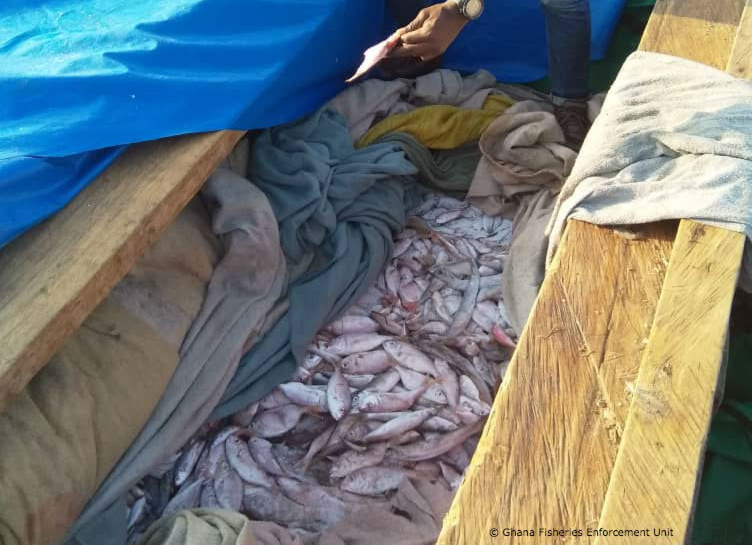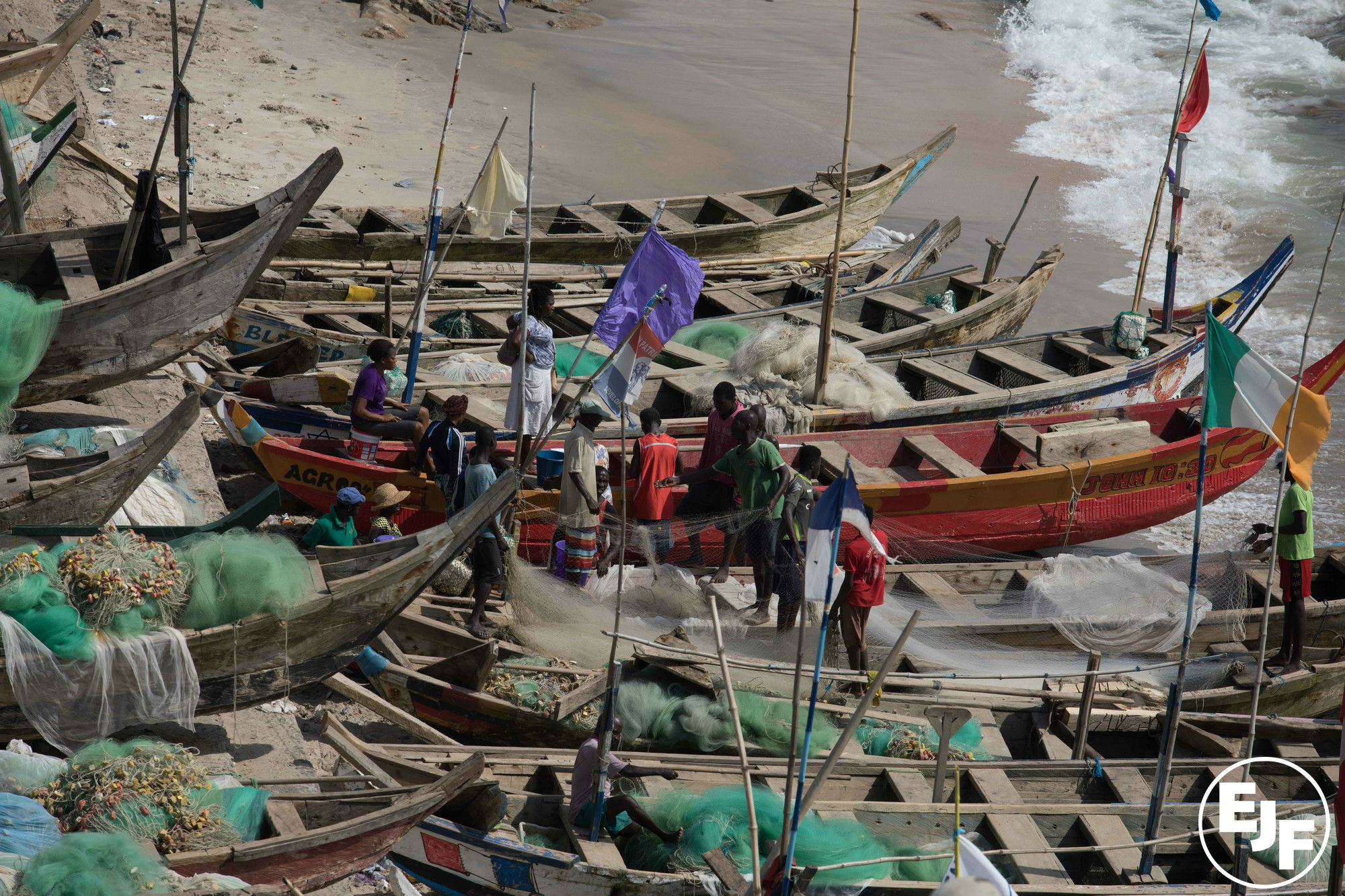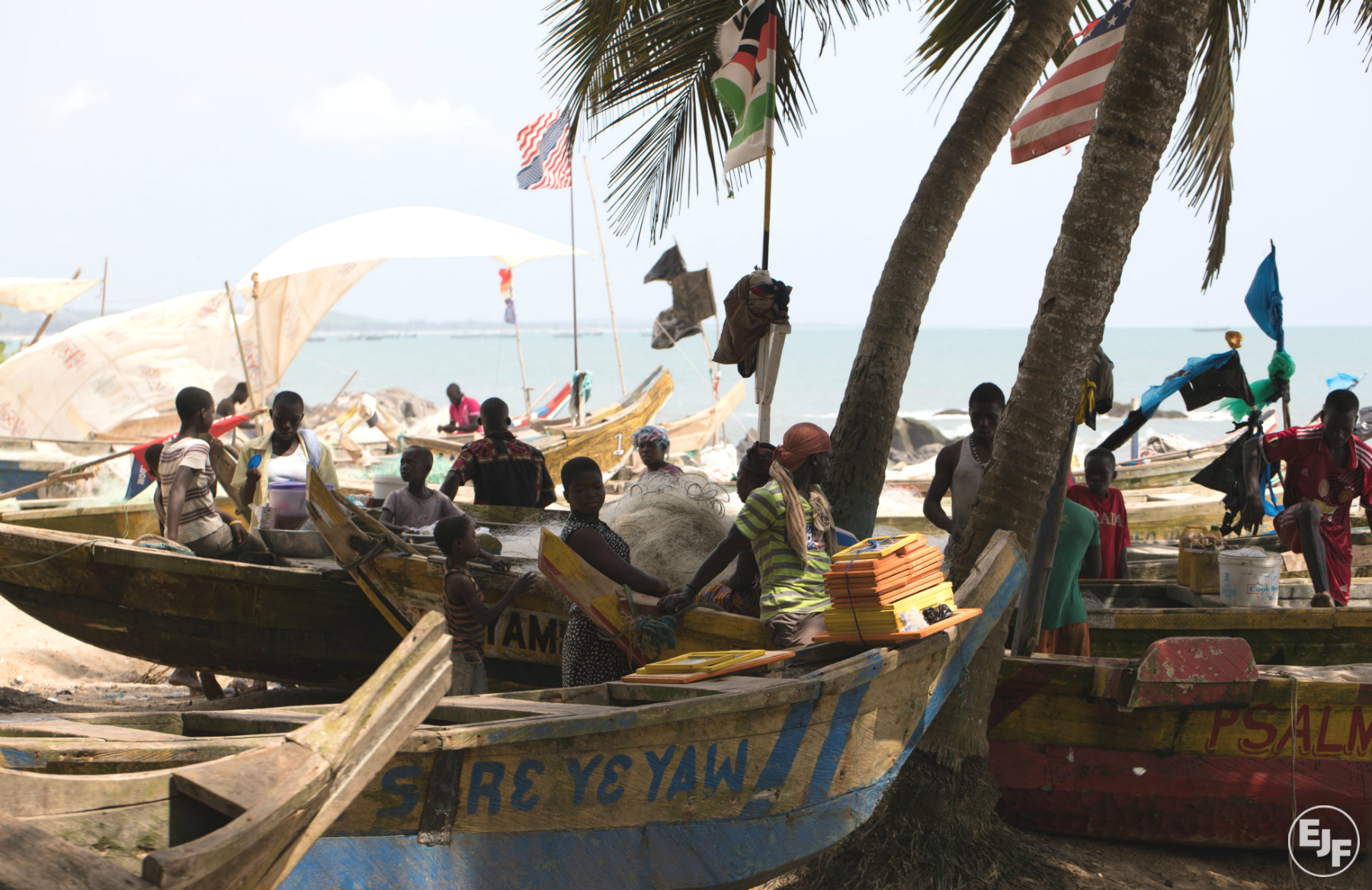
Ghana steps up the fight against illegal fishing practices
Ghana has stepped up its efforts to crack down on ‘saiko’ – an illegal practice driving the collapse of Ghana’s inshore fishery, whereby industrial trawlers sell fish to local canoes at sea. Yesterday, the country’s Fisheries Enforcement Unit intercepted an alleged saiko canoe loaded with tonnes of frozen fish. Suitably deterrent sanctions must follow, say the Environmental Justice Foundation (EJF) and local NGO Hen Mpoano, and they must be imposed not only on the saiko canoe owner, but also the operators and owners of the industrial trawl vessel that caught the fish.
Saiko, originally an informal trading system where unwanted industrial bycatch would be exchanged at sea for fruit and livestock brought by canoes, is now a part of targeted fishing for trawlers in Ghanaian waters. Not only illegal, it puts industrial fishing vessels in direct competition with small-scale fishers for catches of species such as sardinella that are a staple food for local communities. Having effectively ‘stolen’ fish from canoe fishers, saiko operators sell these back to the same fishing communities for profit.
Images taken by the Fisheries Enforcement Unit reveal the sheer volume of fish that may be transported in a saiko canoe – an average saiko trip lands 26 tonnes of fish, the equivalent of around 400 traditional ‘artisanal’ canoe trips. The photos also show that many of the fish intercepted in yesterday’s enforcement action appear to be juveniles – often true for saiko catches – which undermines the ability of the fish stocks to recover from overfishing.
Saiko is illegal under Ghanaian law, attracting a fine of between US$100,000 and US$2 million. The minimum fine increases to US$1 million where catches involve juvenile fish or the use of prohibited fishing gear. The owner and crew of the saiko canoe intercepted on Wednesday have been arrested and taken in for questioning.
“This is essential work on the part of the Ghanaian government and follows the positive steps already taken this year to stop saiko, such as placing observers on vessels” says EJF Deputy Director Max Schmid. “These enforcement actions must now be followed by deterrent sanctions. Importantly, these should be imposed not only on the saiko canoe owner, but also the operators and owners of the industrial trawler that caught the fish. All trawlers are now subject to satellite monitoring, with human observers also present. Along with information from the owner and crew of the saiko canoe, it will be possible to identify the industrial vessel and to hold those responsible to account.”
EJF and Hen Mpoano urge the authorities to be fully transparent in the conduct of this case, and to ensure that the outcome, including the sanctions imposed and the amount paid, are published on the Ministry of Fisheries and Aquaculture Development website.
“Sanctions must be no less than the minimum specified in the legislation, regardless of whether the case is settled in or out of court, and should include the cancellation of licences where repeat offences are detected,” says Director of Hen Mpoano, Kofi Agbogah. “Only then will they act as a true deterrent for potential offenders.”
This case is a crucial opportunity for the government to demonstrate that engaging in illegal and destructive fishing practices in Ghana’s waters will not be tolerated. EJF and Hen Mpoano recommend that the government issues a firm statement to this effect and that the ban on saiko is upheld during the ongoing reform of the Fisheries Act.
Notes for editors
Watch the film from EJF and Hen Mpoano: Ghana: A Fishing Nation in Crisis
Read the briefing from EJF and Hen Mpoano: The Problem with “Saiko”: An Ecological and Human Catastrophe
- Saiko is a highly organised and lucrative practice, accounting for an estimated 100,000 tonnes of illegal and unreported catches in 2017, with an estimated landed value of US$34-65 million.
- According to the Fisheries Scientific and Technical Working Group, the small pelagic fishery – which supports the livelihoods of over 2 million fisherfolk along Ghana’s coastline – could collapse by 2020 in the absence of robust management interventions.
- The Ministry of Fisheries and Aquaculture Development proposed a closed season for all fishing activities, except tuna fishing, in August 2018. While this has now been postponed to 2019 (to allow for more preparation and stakeholder engagement), it is essential that illegal and destructive practices, such as saiko, are shut down to allow for the rebuilding of the resource.
About Far Dwuma Nkɔdo:
The three-year (2017-2019) project is being implemented by the Environmental Justice Foundation (EJF) and Hen Mpoano with the financial support of the European Union and German Federal Ministry for Economic Cooperation and Development (BMZ). As part of this project, EJF and Hen Mpoano are working to help drive a reduction in illegal fishing, and give local fishers a voice in the process to build a more sustainable fishing sector:
- Through a unique combination of local surveillance and remote monitoring, we are strengthening the monitoring and reporting of illegal fishing, and empowering local communities to document illicit fishing activities.
- We are working to empower small-scale fishers, vulnerable and marginalised groups to articulate their interests in fisheries reforms and implement fisheries co-management.
- We are promoting alternative livelihood options for small-scale fishing communities, helping them to diversify their local economies and to reduce their dependence on fishing.
For more information, visit www.ejfoundation.org or www.henmpoano.org
The Environmental Justice Foundation is an international non-governmental organisation working to protect the environment and defend human rights. EJF is a charity registered in England and Wales (1088128). www.ejfoundation.org
Hen Mpoano is a non-profit organization based in Ghana. Its vision is for inclusive and integrated management of Ghana’s coastal and marine ecosystems to generate long-term socio-economic and ecological benefits. www.henmpoano.org
Contacts:
Charles Smith - EJF Ghana Communications Officer
charles.smith@ejfoundation.org
Tel: +233245412531
Daisy Brickhill - EJF Press & Communications Coordinator
daisy.brickhill@ejfoundation.org
Tel: +447871946911
Cephas Asare - Hen Mpoano Programs and Communication Officer
Tel: +233264566788
SIGN UP FOR OUR EMAILS AND STAY UP TO DATE WITH EJF

